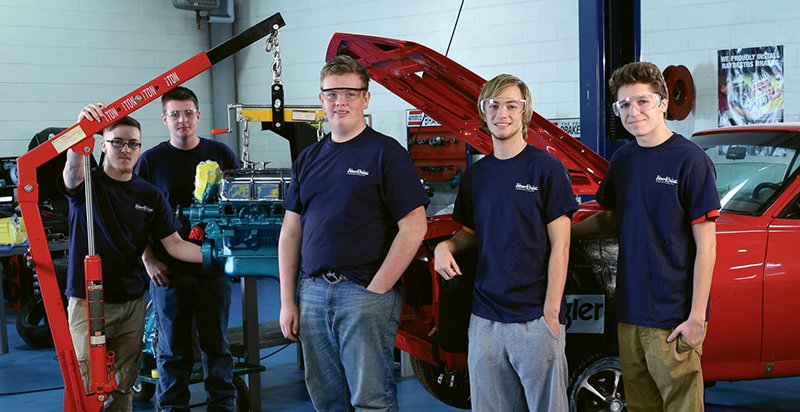Experiential Education
Experiential Education: Service Learning
Working Hard for the Experience - Blue Ridge Community College
It’s a conundrum for college graduates everywhere: How do you gain work experience if no one will hire you without it? At BRCC, that dilemma is overcome through the Work-Based Learning program. Students in both the business and advanced technology tracks are required to work a job within their field. Scott Adams, coordinator of the program, explains the benefits: “Either they offer you a job. If they don’t offer you a job, you have a great reference to move forward with. Or if you go out there and don’t like it, what a great thing to learn now rather than later.” The program is paying off: 60 percent of students are offered jobs after graduation, Adams reports.
Engaging the Community - UNC Asheville
“Most of what we do is help to foster opportunities of experientially learning about the world and systematic social issues in the world outside of campus,” says Rob Campbell, director of UNCA’s Key Center for Community Engaged Learning. The rosy lenses of students are given a thorough dose of reality through a spectrum of programming, from single events to service learning-designated courses. Through the Community Engaged Scholars program, students identify a nonprofit in the Asheville region with a need—like data analysis—that they can fill over the course of several semesters. Alternative Service Experiences plunge students into real work in the real world over spring and fall breaks, with organizations like the Jones Valley Teaching Farm in Birmingham, Alabama.
Serving and Connecting - Western Carolina University
“Experiential learning can lead students to ask questions about how the world works in ways that no other abstract form of thinking can,” notes Lane Perry, director of WCU’s Service Learning programs. In 2016, the university offered an astounding 68 courses with service-learning designations, involving some 1,300 students. The designation appears in classes in every department, from Nutrition—where students visit senior centers to ensure meals are healthful—to Public Relations. Last spring, senior PR students created a marketing campaign for the nonprofit Pisgah Conservancy, garnering enough awareness to obtain a license plate designation.
Learning Leadership - Lenoir-Rhyne University
Over the course of eight semesters, Lenoir-Rhyne’s Engaged Scholars Program immerses students in six learning experiences. Some of these are the standard fare: internships, study abroad, peer tutoring. Other independent creative projects are unique and engage the student in realistic scenarios. Among recent participants, one student hosted her own radio show, while another founded a club for future health care professionals. The skills students carve out through the program are invaluable.
The Warren Wilson Way: Service is synonymous with learning at this mountain college
If you’re looking for proof that the world’s future includes promising leaders, look no further than Warren Wilson College senior Larissa Robinov. She led an effort her freshman and sophomore years to rally her school to begin to divest from fossil fuels on campus. “We got a meeting with the Board of Trustees and presented why it was important, and that’s when they formed the Environmental Social and Governance Committee,” says Robinov. “They invited us to be a part of the process, and it’s been incredibly instructive experiential learning.”
Robinov is a shining example of the school’s commitment to its triad of academics, work, and community service. “A lot of our community engagement comes through service learning-projects,” says Cathy Kramer, vice president for Applied Learning. “Our work crews are involved in a wide range of community efforts—river cleanup, Habitat for Humanity, helping teach education and biology in the schools. Our forestry and landscaping crews helped create a wetland on campus.”
Warren Wilson also has a strong environmental-studies program that is cross-disciplinary. “Our chemistry students learn how we break down compost and recycling,” says Kramer, “while our forest management and farm and garden crews work closely with environmental studies to ensure our practices are sustainable.” Robinov has worked on the forestry crew overseeing the 700-acre campus. “We harvest trees, mill them, sell them, and chop up what’s not millable into firewood,” she says.
Global studies at Warren Wilson is another dynamic example of how the school promotes experiential learning, in countries throughout Asia, South and Central America, and Africa. Robinov, along with three other students, wrote and received a grant to study agriculture this summer in China in an effort to understand how globalization has changed villages and cooperatives. “We’ll be visiting smaller villages that still practice older agricultural practices and will be exchanging information and ideas that we can bring back,” she explains.
Kramer affirms that the school’s overall approach, beyond its liberal arts orientation, stresses hands-on learning across disciplines. “Our archaeology students are also actively working in Morganton at the Berry Site. Our farm and garden local food crew works with food banks and school and community gardens,” she says. “It’s where sustainability, social justice, and environmental justice come together.”
